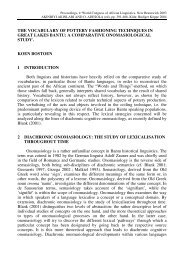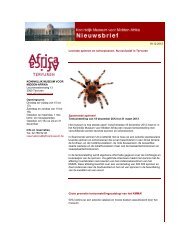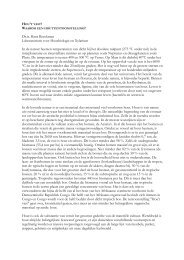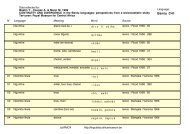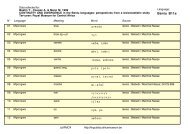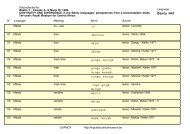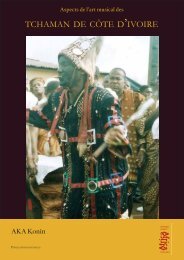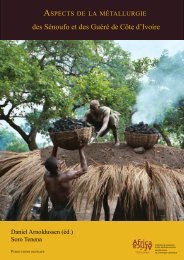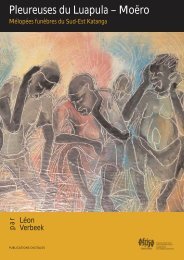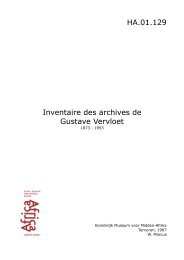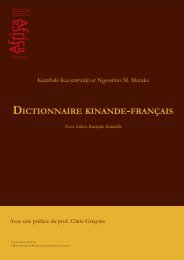- Page 1 and 2:
Le chasseur africain et son monde C
- Page 3 and 4:
LLe chasseur africain et son monde
- Page 5 and 6:
PRÉSENTATION Etant donné que les
- Page 7 and 8:
propos de l’origine de ses chants
- Page 9 and 10:
éventuellement en note l’évolut
- Page 11 and 12:
(katutwa), à la tourterelle (cipel
- Page 13 and 14:
(mfubu, kisenga ntambo, nsenga ntam
- Page 15 and 16:
déclenche pas, à la poudre qui es
- Page 17 and 18:
crépuscule. Les chansons expriment
- Page 19 and 20:
C) VERSION DE KOMBO LÉONTINE (M 21
- Page 21 and 22:
03. Pupe tamuntwale A) VERSION DE K
- Page 23 and 24:
B) VERSION DE MUNYENGEBWE PASCALINE
- Page 25 and 26:
de trouver du miel.» Et en sifflan
- Page 27 and 28:
2. Kyomba ngombe e akansanga yo aka
- Page 29 and 30:
C) VERSION DE KAMBOLO PROSPER (KB 6
- Page 31 and 32:
B) VERSION DE MWABI KASONGO - BEMBA
- Page 33 and 34:
Note. Aux premiers chants d’oisea
- Page 35 and 36:
evient coucher avec son mari, si so
- Page 37 and 38:
I) VERSION DE SAMPALA MARIE - LAMBA
- Page 39 and 40:
D) VERSION DE KASEYA KIFUMBULE - LO
- Page 41 and 42:
F) VERSION DE MPUNDU MWEWA - LALA (
- Page 43 and 44:
Au sanctuaire ne passent pas les se
- Page 45 and 46:
2. Ifilekito mukashi ku mushi taufi
- Page 47 and 48:
fait ta femme au village vous ne po
- Page 49 and 50:
2. Wikeba ati lusengo bwanga bukali
- Page 51 and 52:
Commentaire Il y avait un garçon q
- Page 53 and 54:
quand ils pourchassaient les élép
- Page 55 and 56:
les bêtes. Alors tu te dis : «Que
- Page 57 and 58:
2. Waluba shani we mbwela Comment t
- Page 59 and 60:
J) VERSION DE KAYUMBA PAULINE - LAL
- Page 61 and 62: d’hydromel, ils commencent à boi
- Page 63 and 64: chantions en disant : «Mu mpango..
- Page 65 and 66: Note. Quand il est en brousse, le c
- Page 67 and 68: 2. Nkaya nabo mu mpanga muliweme Je
- Page 69 and 70: B) VERSION DE GROUPE DE DANSEURS DE
- Page 71 and 72: H) VERSION DE KALUNGA VICTOR - BEMB
- Page 73 and 74: Note. Le chasseur apprenti demande
- Page 75 and 76: I) VERSION DE MUSONDA KYASHA - LALA
- Page 77 and 78: Les chansons de chasse se chantent
- Page 79 and 80: Note. Mboswa : homonymie entre une
- Page 81 and 82: C) VERSION DE MUNKINI - SANGA (MK 1
- Page 83 and 84: Par extension, un homme qui se resp
- Page 85 and 86: C) VERSION DE MUNKINI - AUSHI (MK 2
- Page 87 and 88: 3. Mitutu ku nama lelo imitutu ee n
- Page 89 and 90: Note. Au lieu de naumfwa, on a enco
- Page 91 and 92: jamais préparé avec la tête ou l
- Page 93 and 94: 4. Nasha namilange kisendekela nebo
- Page 95 and 96: 2. Mu kitungulu muli nama Dans la b
- Page 97 and 98: Lorsqu’il arrive tout près, il s
- Page 99 and 100: 4. We buta wansebanya (2x) Toi fusi
- Page 101 and 102: Note. Voir aussi L. Verbeek, 1993 :
- Page 103 and 104: V) VERSION DE MUKOSHA - AUSHI (MF 1
- Page 105 and 106: Note. Le papa meurt et l’enfant r
- Page 107 and 108: Commentaire (P 12) Q. Parlez-nous m
- Page 109 and 110: Commentaire (SK 99/5) Note. Chant e
- Page 111: B) VERSION DE KALUNGA VICTOR - LALA
- Page 115 and 116: Commentaire C’est un chant de cha
- Page 117 and 118: Note. Le chasseur qui fournissait d
- Page 119 and 120: 2. Nsempe shakwe batolele Pour son
- Page 121 and 122: H) VERSION DE NGOY KITAMBALA - AUSH
- Page 123 and 124: Nalushika bantu : enterreur de gens
- Page 125 and 126: 2. Kitondo kekishale Le mauvais cha
- Page 127 and 128: On compare le chasseur et le cueill
- Page 129 and 130: qu’on a chanté ce chant qui dit
- Page 131 and 132: G) VERSION DE KALAMA - BEMBA (MN 64
- Page 133 and 134: 4. We sha mupamba shantukile abaya
- Page 135 and 136: 2. Kamupelapo abanenu bakese (mu) k
- Page 137 and 138: Commentaire Cette chanson signifie
- Page 139 and 140: Commentaire Il s’agit d’un chas
- Page 141 and 142: feu et préparaient beaucoup de bou
- Page 143 and 144: 2. Mu milamba tata e mu milamba ban
- Page 145 and 146: G) VERSION DE KAYUMBA WA MULAO - LO
- Page 147 and 148: 3. Mu mayamba mu mayamba mu mayamba
- Page 149 and 150: D) VERSION DE KILUFYA JUSTINE - KAO
- Page 151 and 152: ou ou!» C’est la détonation du
- Page 153 and 154: Commentaire En ce moment,la marmite
- Page 155 and 156: H) VERSION DE MUTINKE SHINDIONDIO -
- Page 157 and 158: 2. Kisungwa mwakibwenepo Le buffle
- Page 159 and 160: de la rivière avec la lance et la
- Page 161 and 162: Note. Le chasseur manifeste de la r
- Page 163 and 164:
Note. Si ingombe signifie vaches, b
- Page 165 and 166:
E) VERSION DE MUNKINI - AUSHI (MK 1
- Page 167 and 168:
3. Leta mikoki leta mikoki tulile m
- Page 169 and 170:
H) VERSION DE YOMBWE KANKELEBWE ET
- Page 171 and 172:
maison, il peut commencer à chante
- Page 173 and 174:
2. Mangondo pe shilya (3x) Des tapa
- Page 175 and 176:
4. Maombe lele maombe maombe lele m
- Page 177 and 178:
2. Ba fwifwi na mungomba bakulu bal
- Page 179 and 180:
Il s’agit d’un chasseur qui com
- Page 181 and 182:
4. Mwana muyembe nshimona mikila ya
- Page 183 and 184:
G) VERSION DE GROUPE DE MUTABI - BW
- Page 185 and 186:
B) VERSION DE NKIMA KYAPA - LALA (P
- Page 187 and 188:
3. Sombi ukulu no mutwe fya bamwela
- Page 189 and 190:
Mais en vain. Il s’est dit : «C
- Page 191 and 192:
3. Likonka ngombe kibinda mwakita m
- Page 193 and 194:
invoquent les esprits pour toi et t
- Page 195 and 196:
et qu’il s’est approché de la
- Page 197 and 198:
75. Nkinke mabele ndi wa bwanga A)
- Page 199 and 200:
B) VERSION DE SASHI CHALWE - BEMBA
- Page 201 and 202:
I) VERSION DE GROUPE DE KASHOBWE -
- Page 203 and 204:
2. Nakanyemena mu kaulu banwe pa ku
- Page 205 and 206:
E) VERSION DE KAMBOLO PROSPER - LAM
- Page 207 and 208:
4. Mu kalupya shapulula amabula A t
- Page 209 and 210:
5. Ne mbula kulasa nkaya nabo e A d
- Page 211 and 212:
accuser de ne rien lui donner. Un k
- Page 213 and 214:
Les chasseurs expriment leur joie p
- Page 215 and 216:
3. Ba Shilembo ee yoyo we yowele le
- Page 217 and 218:
F) VERSION DE SUBAILA KANTONDI - LA
- Page 219 and 220:
5. Tolonda Lito tolonda muntu wa ku
- Page 221 and 222:
Commentaire Je peux avoir un genou
- Page 223 and 224:
G) VERSION DE KISUNKA MUMBA - AUSHI
- Page 225 and 226:
E) VERSION DE MUSHIMI ETC. - SHILA
- Page 227 and 228:
6. Nyina namula enda nebo we kinama
- Page 229 and 230:
B) VERSION DE FEMME INCONNUE (SK 20
- Page 231 and 232:
4. Twilimune abainga mipashi yende
- Page 233 and 234:
N) VERSION DE MULENGA KATEBE - BEMB
- Page 235 and 236:
2. Mipashi yende kyungulo (4x) Les
- Page 237 and 238:
Commentaire Nos anciens nous disaie
- Page 239 and 240:
une antilope (nkonshi) ou une gazel
- Page 241 and 242:
2. Iyayi mumbone nafwalilwe filabo
- Page 243 and 244:
E) VERSION DE KIPILI MUMBA - AUSHI
- Page 245 and 246:
C) POUR D’AUTRES VARIANTES, MULUM
- Page 247 and 248:
2. Kabanda kabanda kabanda kabekumy
- Page 249 and 250:
C) VERSION DE MULOFWA MWIKA - LAMBA
- Page 251 and 252:
qui ne peuvent pas être égaux qua
- Page 253 and 254:
D) VERSION DE LWAMFWE KASAMATA - BE
- Page 255 and 256:
B) VERSION DE MWALE BAUDOUIN - KAON
- Page 257 and 258:
Commentaire Les nkonshi sont de pet
- Page 259 and 260:
Q. Pourquoi chante-t-on cette chans
- Page 261 and 262:
Commentaire Q. Est-ce que vous pouv
- Page 263 and 264:
Commentaire C’est le petit chant
- Page 265 and 266:
Commentaire Pour louer nos ancêtre
- Page 267 and 268:
Commentaire C’est une chanson des
- Page 269 and 270:
Commentaire Les kaluwe, ce sont eux
- Page 271 and 272:
H) VERSION DE MAMBWE GASTON - SANGA
- Page 273 and 274:
P) VERSION DE KILIMA NDJANO - SANGA
- Page 275 and 276:
Note. On loue le chasseur qui coupe
- Page 277 and 278:
R. Mwisha ngombe mwisha ngombe lung
- Page 279 and 280:
Commentaire Dans la petite calebass
- Page 281 and 282:
B) VERSION DE KYUSHI NGANDWE - AUSH
- Page 283 and 284:
B) VERSION DE KALUNGA VICTOR - LALA
- Page 285 and 286:
Note. La bière cause des désaccor
- Page 287 and 288:
108. Nebo kasansa matanga PARTIE II
- Page 289 and 290:
B) VERSION DE MUSONDA KYASHA (P 4/5
- Page 291 and 292:
B) VERSION DE WAITI KISENGA (CM 17/
- Page 293 and 294:
Note. Le chasseur se loue. Il court
- Page 295 and 296:
gens préparaient dans plusieurs ma
- Page 297 and 298:
3. Kyungulo tukonke banyama... Et l
- Page 299 and 300:
130. Kibinda wiya kutina A) VERSION
- Page 301 and 302:
Note. Mwalabanya bitimba alterne av
- Page 303 and 304:
Commentaire Ce sont les chasseurs q
- Page 305 and 306:
5. Nyina kulila nyina kulila yombwe
- Page 307 and 308:
Commentaire Quand Mulaya était au
- Page 309 and 310:
Note. Le chanteur se voit très mal
- Page 311 and 312:
Commentaire C’est un chant de cha
- Page 313 and 314:
21. Ba kibinda te apo mu malima ngo
- Page 315 and 316:
2. Mwelaisha R. Chasseur qui court
- Page 317 and 318:
163. Muteketelwa ukubamba A) VERSIO
- Page 319 and 320:
Note. Nkema : bâton employé pour
- Page 321 and 322:
Commentaire C’est aussi une chans
- Page 323 and 324:
Commentaire C’est un chant pour l
- Page 325 and 326:
179. Mukombola mwipaye ba kibinda V
- Page 327 and 328:
4. E muko ngulya kyalaula mpapa way
- Page 329 and 330:
C) AUTRE VERSION, L. VERBEEK, 2001
- Page 331 and 332:
Note. Ukupila : puiser et verser ai
- Page 333 and 334:
198. Mwana wangi shawama VERSION DE
- Page 335 and 336:
203. Muleke kiwowo A) VERSION DE SE
- Page 337 and 338:
11. Kamfyala ba kakunta ngoma ba Mw
- Page 339 and 340:
3. Bu kibinda nasendela bwa kuyesha
- Page 341 and 342:
216. Ba Mulaya nkaya nabo VERSION D
- Page 343 and 344:
2. Nshitina bukali bwa nama nshilas
- Page 345 and 346:
2. Umulume wa nsongo talala Le mâl
- Page 347 and 348:
231. Bakalembula e VERSION DE CANGW
- Page 349 and 350:
d’appel s’y font entendre. Il y
- Page 351 and 352:
4. Kutali natulile ku mwenda nama n
- Page 353 and 354:
2. Kaluwe ni mwe beta Les kaluwe c
- Page 355 and 356:
Shimaluba c’est la femme qui l’
- Page 357 and 358:
Commentaire C’est l’enfant de M
- Page 359 and 360:
11. Kumfwa kyalunduma kitenda bushi
- Page 361 and 362:
D) VERSION DE KABEBA NKONGA (SK 20/
- Page 363 and 364:
263. Twalukwenda na bakaluwe VERSIO
- Page 365 and 366:
B) VOIR UNE VARIANTE, L. VERBEEK, 1
- Page 367 and 368:
Note. Le chasseur a été très loi
- Page 369 and 370:
Commentaire Ce sont les kaonde ceux
- Page 371 and 372:
Note. Mankabwa : boisson, ici pris
- Page 373 and 374:
Commentaire C’est une chanson des
- Page 375 and 376:
B) D’AUTRES VERSIONS, VERBEEK, 19
- Page 377 and 378:
2. Yaleta mukele mbwela Il apporte
- Page 379 and 380:
Commentaire Ca veut dire ceci. Les
- Page 381 and 382:
2. Isho shikolila sha kwa kibinda m
- Page 383 and 384:
301. Kyafwatafwata ni nama batekamo
- Page 385 and 386:
2. Ni ndeke ilukutwala petelo mu ki
- Page 387 and 388:
Note. Ikolongo : un oiseau très gr
- Page 389 and 390:
Commentaire Donc le chasseur veut d
- Page 391 and 392:
2. Kanshi abaweme tabalya bwino owe
- Page 393 and 394:
320. We sumbo bwanga A) VERSION DE
- Page 395 and 396:
mais pour les autres c’était du
- Page 397 and 398:
Commentaire C’est un chant du cul
- Page 399 and 400:
Note. Tubila tunwe alterne avec tuk
- Page 401 and 402:
338. Muka fundi e wankenkema VERSIO
- Page 403 and 404:
Commentaire Il s’agit de ces terr
- Page 405 and 406:
R. On appelait la mère du chef et
- Page 407 and 408:
6. Kuli ba Mwape te pa kumfwaya Che
- Page 409 and 410:
2. Kanshi nga ni mbowo we kiname ki
- Page 411 and 412:
Mumpulasa, Benoït. Tous venaient e
- Page 413 and 414:
s’est l’animal. L’aigle kipun
- Page 415 and 416:
362. Mwele wandi tula inama VERSION
- Page 417 and 418:
chasseurs qui sont possédés par l
- Page 419 and 420:
368. Kapombo mulikengele VERSION DE
- Page 421 and 422:
372. Nduba lelo nduba VERSION DE MU
- Page 423 and 424:
Pendant la saison de pluie elles se
- Page 425 and 426:
2. Ala bansumbu mafuta balya Commen
- Page 427 and 428:
2. Musondo mwana bamulesho kuleme n
- Page 429 and 430:
partir. Ils se sont dit : «Partons
- Page 431 and 432:
2. Wapalapala mu kalunga we nkwale
- Page 433 and 434:
6. Mansakansaka maombe maombe ee ma
- Page 435 and 436:
la préparer vous-même! Ca ne fait
- Page 437 and 438:
406. Nshakende nabo bakalume A) VER
- Page 439 and 440:
Note. Lwabulo : de kwabula : tirer
- Page 441 and 442:
2. Kangomba lolo kangomba ee kangom
- Page 443 and 444:
8. Yo Kasonso Kasonso wafuma ku ban
- Page 445 and 446:
8. Maombe mwikata kiluwe luwe mpond
- Page 447 and 448:
B) VERSION DE KAKENGELA TOLWE (CK 4
- Page 449 and 450:
428. Fwe tukafwa ku mangebengebe VE
- Page 451 and 452:
Kusoboka : déclencher. Tantôt les
- Page 453 and 454:
438. Mwe fipumbu VERSION DE KASANGA
- Page 455 and 456:
Commentaire Il y a un animal appel
- Page 457 and 458:
448. Nafwa maundu VERSION DE BWALYA
- Page 459 and 460:
5. Tata lya bwanga kali ku lupili M
- Page 461 and 462:
Note. Comme on parle d’un chasseu
- Page 463 and 464:
oncle) ; nobe wesu (toi aussi, frè
- Page 465 and 466:
2. Apa tabukile bampele akatimuna m
- Page 467 and 468:
2. Tata alile Papa est parti Note.
- Page 469 and 470:
472. Kisankunta ku mikila ya nama V
- Page 471 and 472:
Note. On désigne l’auteur de la
- Page 473 and 474:
2. Munenu washibangwile shamulema a
- Page 475 and 476:
D) VERSION DE MATANDA MWAPE ESTHER
- Page 477 and 478:
Commentaire Les chasseurs se vanten
- Page 479 and 480:
où ils étaient et les contente. I
- Page 481 and 482:
13. Mbwela waya e mwana wa bulimi m
- Page 483 and 484:
Note. Voir aussi la ch. 445, 503. 5
- Page 485 and 486:
2. Kibondo kya nama C’est le sabo
- Page 487 and 488:
515. Yemwe akaonga A) VERSION DE MW
- Page 489 and 490:
après, tu regardes ailleurs. Tu le
- Page 491 and 492:
4. Ba nkwanda mu kibala iyo Les nkw
- Page 493 and 494:
B) VERSION DE MUNKINI - SANGA (MK 8
- Page 495 and 496:
ces animaux-là qui vont me tuer. J
- Page 497 and 498:
Commentaire Ce chant est chanté po
- Page 499 and 500:
2. Lelo kankundulyu e nkaye na tata
- Page 501 and 502:
2. Kisongo mukashi pita ku mbabe wa
- Page 503 and 504:
frères avec lesquels je suis né d
- Page 505 and 506:
3. Leta yaya nkubabile Amène, ma c
- Page 507 and 508:
565. Abalya katapa VERSION DE KIJIB
- Page 509 and 510:
Commentaire Le chasseur était part
- Page 511 and 512:
Commentaire Le hibou est abandonné
- Page 513 and 514:
que je suis en train de danser. Voi
- Page 515 and 516:
579. Tata kitapa ngolo mwina myaba
- Page 517 and 518:
4. Lelo ndisabile ke byonka afwele
- Page 519 and 520:
2. Nkotuka ki betwe bekalile kwasa
- Page 521 and 522:
comme on le dit : c’est la nudit
- Page 523 and 524:
2. Bana ba mbwela tupeniko akasembe
- Page 525 and 526:
Note. C’est un chant de deuil de
- Page 527 and 528:
especte celui qui divise la famille
- Page 529 and 530:
606. Mukashi wa bana tufyale bana P
- Page 531 and 532:
D) VERSION DE KIBWE COLA (BW 21/3 ;
- Page 533 and 534:
2. Ngoma yalisha Mutanga mutima mun
- Page 535 and 536:
615. Muyo lilwe na nyama VERSION DE
- Page 537 and 538:
on étalait une natte. Le chef lui-
- Page 539 and 540:
2. E kene mikuni C’est cela le tr
- Page 541 and 542:
Commentaire Cela veut dire que moi,
- Page 543 and 544:
Note. Mitima alterne avec mikila (l
- Page 545 and 546:
Note. Il s’agit du jeune chasseur
- Page 547 and 548:
2. Noko kutemwa mwe banesu Avec cet
- Page 549 and 550:
641. We kyoso leto bwato A) VERSION
- Page 551 and 552:
2. Bakulu bapwa ukufwa e ndekita sh
- Page 553 and 554:
2. Ndi mwana wa mbwela Selenge Je s
- Page 555 and 556:
4. Kibinda e kamilobela kamwipaye L
- Page 557 and 558:
B) D’AUTRES VERSIONS, L. VERBEEK,
- Page 559 and 560:
B) VOIR AUTRE VERSION : L. VERBEEK,
- Page 561 and 562:
3. Muto weka kibinda twalishama C
- Page 563 and 564:
4. Umutima wateya ku bwabulo Il pr
- Page 565 and 566:
papa, quel nombreux troupeau de bê
- Page 567 and 568:
Note. Au cours de la reprise de la
- Page 569 and 570:
Commentaire C’est quand les chass
- Page 571 and 572:
4. Nshangale ku mabale nkalamo nsha
- Page 573 and 574:
Note. Au lieu de balendaisha, il y
- Page 575 and 576:
695. Nati ngende VERSION DE MUONGA
- Page 577 and 578:
Commentaire (MN 25) Akoni ka mu man
- Page 579 and 580:
Note. Il s’agit d’une allusion
- Page 581 and 582:
B) VERSION DE MUTILA MUOMBE - LAMBA
- Page 583 and 584:
710. Ubwanga bwa kwa tata VERSION D
- Page 585 and 586:
715. Tata mpape VERSION DE MWILAMBW
- Page 587 and 588:
B) VERSION DE MUMBA EMELE - LAMBA (
- Page 589 and 590:
viande chez cette femme du chasseur
- Page 591 and 592:
723. O leta mukila VERSION DE MWILA
- Page 593 and 594:
2. Nalila kiito kya bambwela - ee k
- Page 595 and 596:
Tu ne le critiqueras pas hé, le ch
- Page 597 and 598:
731. Luno lo naenda ne mungili A) V
- Page 599 and 600:
3. Tata wafwa mayo wafwa owe ni nan
- Page 601 and 602:
Commentaire Ce sont les paroles d
- Page 603 and 604:
3. Kishiki wimbumba taulanda e Souc
- Page 605 and 606:
5. Yo bana ba kuno baya na mwela Ô
- Page 607 and 608:
Note. Le chasseur est renseigné pa
- Page 609 and 610:
Commentaire C’est une chanson de
- Page 611 and 612:
«Chasseur, va puiser de l’eau.»
- Page 613 and 614:
Il se dit : «Si c’étaient des c
- Page 615 and 616:
R1. Mobole wa ku mushitu e Le mobol
- Page 617 and 618:
2. Kuno wafwa ku nama e kuno wafwa
- Page 619 and 620:
780. Mwine bwanga takepa A) VERSION
- Page 621 and 622:
We mukashi ntule alterne avec : E t
- Page 623 and 624:
15. Wa kileya nkimbe nandi Celui qu
- Page 625 and 626:
R. Ces esprits, il y a ceux qui fon
- Page 627 and 628:
Note. On sait qu’on va bien mange
- Page 629 and 630:
8. Kwatayipo bakwetu Attrapez-y, me
- Page 631 and 632:
Note. On loue l’oiseau calao pour
- Page 633 and 634:
2. Eko nkafwila shimukanamina kubam
- Page 635 and 636:
808. Nkamulila mu ngoma tata VERSIO
- Page 637 and 638:
4. Nkalya no mwele Je mangerai avec
- Page 639 and 640:
19. Kasongo ee ukalale shilwa ku ba
- Page 641 and 642:
825. Yo ni nani wamwene mfundi kulo
- Page 643 and 644:
Commentaire Quand le chasseur revie
- Page 645 and 646:
On s’encourage mutuellement pour
- Page 647 and 648:
17. Ntomboke mayo R1. Que je me reb
- Page 649 and 650:
5. Lelo twabwela mayo R. Aujourd’
- Page 651 and 652:
15. Mwe mbwela wandi ntomboke ntomb
- Page 653 and 654:
2. Natimwina ee bana balume Je dans
- Page 655 and 656:
10. Mukunta kalimba e muko mukunta
- Page 657 and 658:
2. Nyimbo miyowa lolo miyowa ntanda
- Page 659 and 660:
R. Tukaimwena tukaimwena mu kupanda
- Page 661 and 662:
Commentaire Ce chant est chanté pa
- Page 663 and 664:
862. Shalala pe lungu PARTIE VIII.
- Page 665 and 666:
Commentaire Un chasseur était part
- Page 667 and 668:
2. Lelo kamupela abanenu e wo wo ka
- Page 669 and 670:
Commentaire Le chasseur lorsqu’il
- Page 671 and 672:
7. Wawawe Sanguze namuwana mu chana
- Page 673 and 674:
885. Nadi biya VERSION DE NSAKANYA
- Page 675 and 676:
890. We kafuko tute loba VERSION DE
- Page 677 and 678:
894. Kuno amanyama kyatyaba VERSION
- Page 679 and 680:
- Wafwa walilwapo (il faut mourir p
- Page 681 and 682:
2. Wami twende yo luwe wami lolo lu
- Page 683 and 684:
Commentaire C’est une chanson de
- Page 685 and 686:
5. Maikinke e ku malila kyoni ku ma
- Page 687 and 688:
909. Ati kwenda bityebitye VERSION
- Page 689 and 690:
- mpumpa, cf. ch. 674 - mushitu, fo
- Page 691 and 692:
Culte de la pluie, cf. ch. 300, 346
- Page 693 and 694:
Gibécière, cf. ch. 277 ; nkonga (
- Page 695 and 696:
Annexe II. Le culte Sources: Bemba-
- Page 697 and 698:
Ndoshi, syn. mfwiti, sorcier, cf. c
- Page 699 and 700:
Kikoloma : chef lamba du Congo, Ver
- Page 701 and 702:
Pweto / Mpweto, chef au nord du lac
- Page 703 and 704:
Koni malonda, rapace, cf. ch. 754 K
- Page 705 and 706:
Kisumpa, hyène tachetée, Dict. Cl
- Page 707 and 708:
Nsongo, élan du Cap, Dict. Claquin
- Page 709 and 710:
Nkunde, lentille, en kibemba ; luku
- Page 711 and 712:
Lyanga, danse des chasseurs lala, c
- Page 713 and 714:
Annexe V. Liste des enquêtes et de
- Page 715 and 716:
24. Kalunga Edouine (1923, f.), Mwa
- Page 717 and 718:
02. Id., cf. ch. 32a, 33f. 04. 25.0
- Page 719 and 720:
KM : enquêteur Mambwe Kaleba infor
- Page 721 and 722:
LKb : enquêteur Lubambula Kipota 8
- Page 723 and 724:
105. Mwenda Mukandabantu (1944), Mu
- Page 725 and 726:
Kabaso wa Kabaso, cf. ch. 76c, 684b
- Page 727 and 728:
enquêteur Mwenya Cabala, à Kipush
- Page 729 and 730:
205. Mulumbwa Kapya, à Mukinda, 09
- Page 731 and 732:
L. Verbeek, 1990, p. 23-24, ch. 458
- Page 733 and 734:
BAXTER, P. & TREVOR, W. (1986) Gira
- Page 735 and 736:
EDME, Ph. (1944) Nkoya Kalambwa, sc
- Page 737 and 738:
JOIRIS, D.A. (1993) Baba Pygmy Hunt
- Page 739 and 740:
ROGER, H. (1983) The Ritual Hunt :
- Page 741 and 742:
TURNER, V.W. (1962, 1967) Themes in
- Page 743 and 744:
GREVISSE, E. (1956-1958) Notes ethn
- Page 745:
VERBEEK, L. (1992) L’histoire dan




